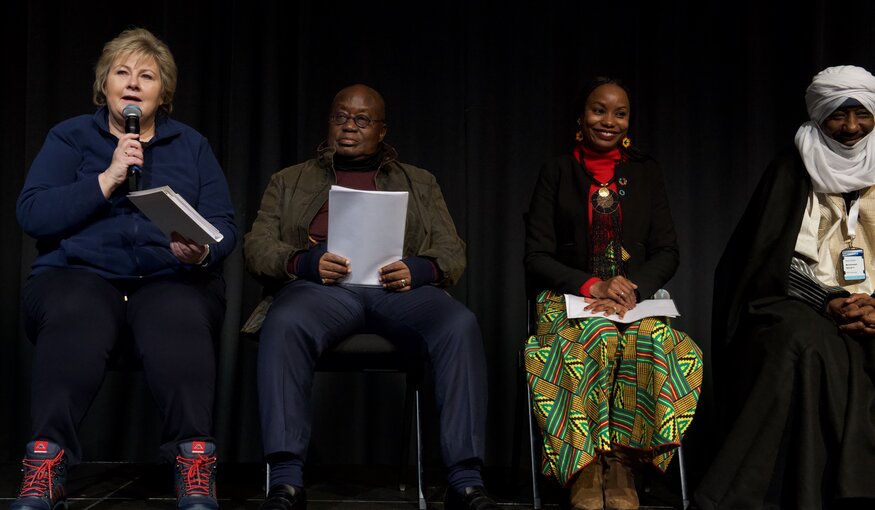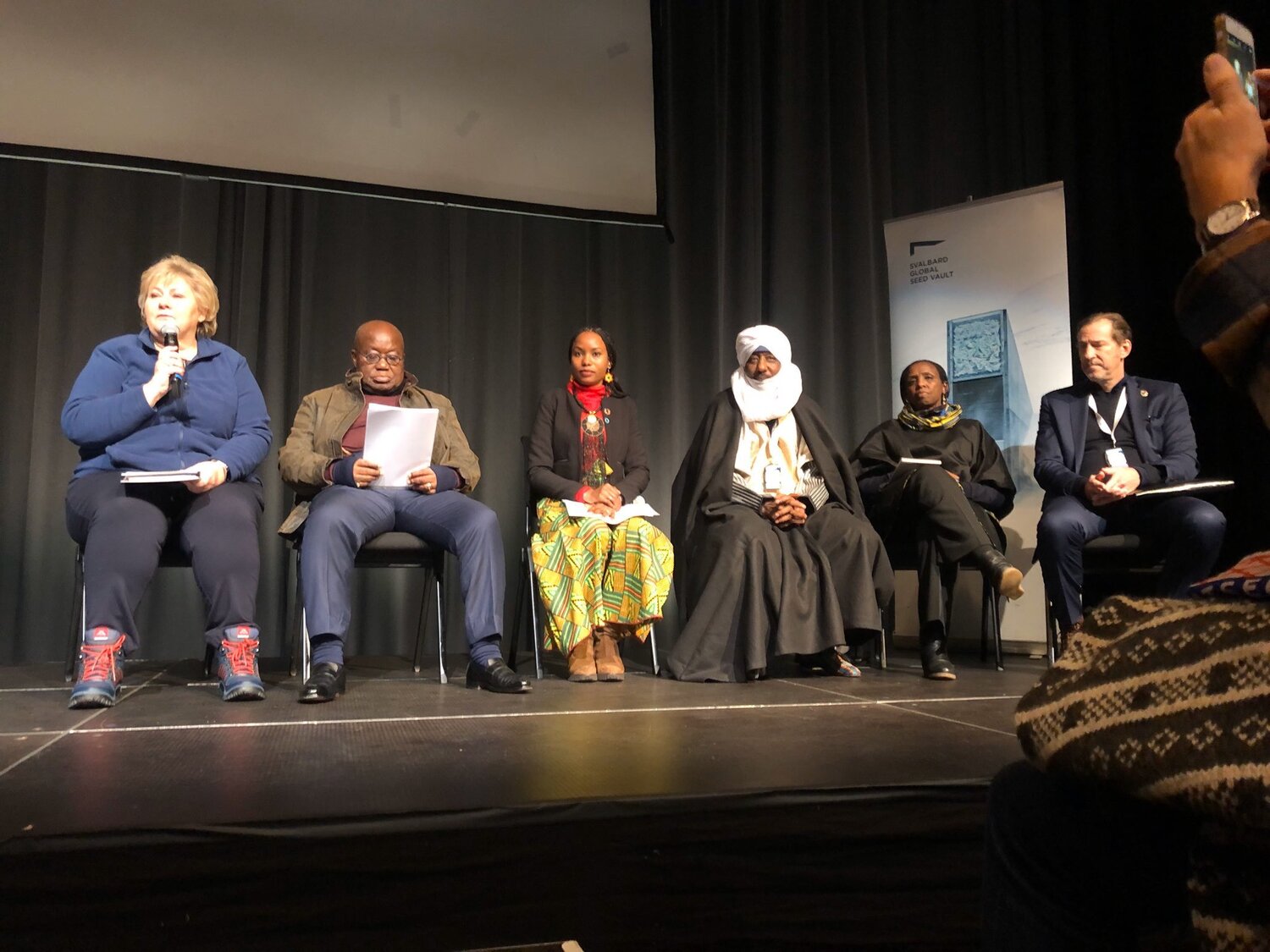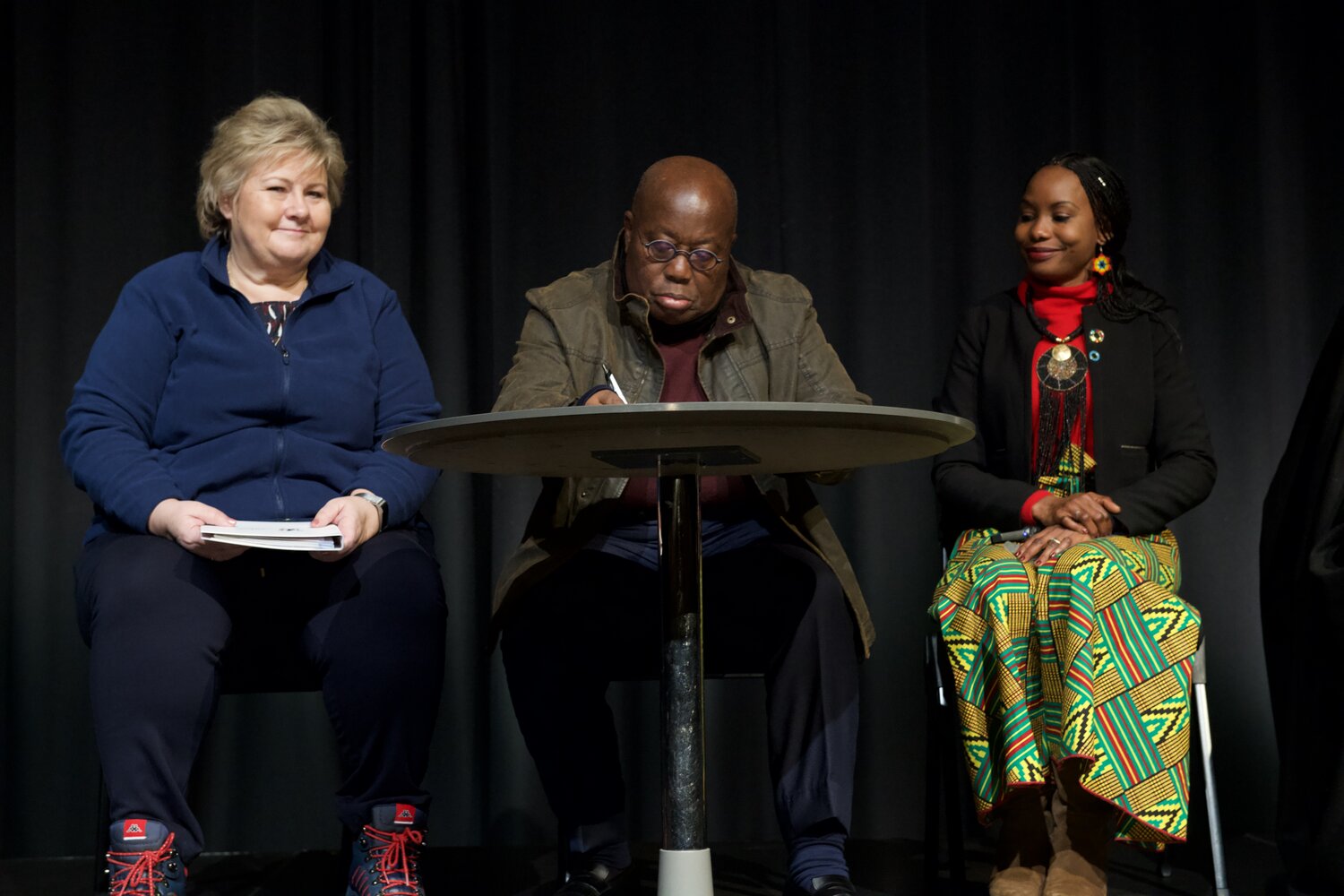Arctic Call to Action on Food Security and Climate Change

4 March 2020
25 February 2020 | Svalbard, Norway
Originally posted here.
UN Secretary-General Mr Antonio Guterres has called for a decade of action and delivery to achieve the Sustainable Development Goals (SDGs) by 2030. With just 10 years to go, there is an urgent need for an intensified global effort to achieve the goals. The broad mobilization of governments, business and civil society will be required. ‘Now is the time for bold leadership, both individual and collective. […] We need to move together,’ Secretary-General Guterres stated in September 2019.
Members of the Secretary-General’s group of SDG Advocates, which is co-chaired by Prime Minister Erna Solberg of Norway and President Nana Akufo-Addo of Ghana, met on 25 February 2020 in the Arctic archipelago of Svalbard, Norway, to discuss food security and climate change. They also took part in a seed deposit event at the Svalbard Global Seed Vault. The Seed Vault serves as a backup facility for the genetic diversity of seeds for future generations.
For decades, the number of people living in hunger was declining, but since 2015 this number has once again started to increase. According to the 2019 UN report State of Food Security and Nutrition in the World, more than 820 million people are undernourished. Reversing this trend and ending hunger and all forms of malnutrition by 2030 is an immense challenge, but it is also essential if we are to reach the other SDGs. In particular, SDG target 2.5 – maintaining the genetic diversity of seeds, cultivated plants and farmed and domesticated animals and their related wild species – is highly relevant to these efforts, and was addressed specifically in Svalbard.
The following points formed the basis for our discussions in Svalbard:
The world’s land and water resources are being exploited at an unprecedented rate, and this is threatening to undermine humankind’s ability to feed itself. Climate change is making the situation even worse, as increased climate variability and more frequent extreme weather events threaten to disrupt, and over time diminish, the global food supply. The impact of climate change is having serious consequences for agricultural production. There is an urgent need for increased ambition and action to promote effective implementation of the Paris Agreement.
If we are to succeed in ensuring food security for growing populations in an increasingly warmer world, we must continue to adapt our food systems to climate change as well as work to make them more inclusive and efficient. Transforming our food systems offers a pathway to improved resilience of ecosystems, reduced vulnerability of rural populations to climate impacts, and enhanced contributions to climate change mitigation. Genetic diversity is essential for ensuring sustainable agriculture. By making use of this diversity, we can develop crops that are more heat-, drought- and flood-resistant.
But the clock is ticking. SDG target 2.5 calls on the international community to maintain the genetic diversity of both crops and livestock by 2020, and promote access and benefit sharing. Currently, the international community is not on track to reach this target.
The genetic diversity of food is essential for food security. Today, some 60 % of our daily calories come from just four crops (wheat, rice, maize and potato). It is the vast range of species and varieties cultivated by farmers that underpins the resilience of our food supply; in fact, we are dependent on this diversity for our food security, wellbeing and health.
Small-scale food producers play a key role in ensuring global food security, but they are vulnerable to the impacts of climate change. Supporting these producers so that they can adapt to climate change is therefore a key priority.
The UN Secretary-General hosted Food Systems Summit in 2021 offers an opportunity to catalyze large-scale public mobilization and actionable commitments to make food systems sustainable, climate adapted, resilient and to the benefit of all.

The UN SDG Advocates at the Svalbard 2020 Seed Summit: Prime Minister of Norway, Erna Solberg, the President of Ghana, Nana Akufo-Addo, Hindou Oumarou Ibrahim, Muhammad Sanusi II, Agnes Kalibata and Robb Skinner.

The Prime Minister of Norway and the President of Ghana signing the Call to Action in Svalbard on Behalf of the SDG Advocates.
We, the group of SDG Advocates hereby issue our Arctic Call to Action on Food Security and Climate Change:
We remind all people as a matter of urgency that the Sustainable Development Goals (SDGs) and the goals set out in the Paris Agreement are the roadmap to our common future, and that we must leave no one behind as we strive to reach these goals.
We urge all governments, as well as the private sector and civil society, to heed the UN Secretary-General’s call to commit to a decade of action and delivery for sustainable development, so that we can reach the SDGs by 2030.
To this end, we call on all leaders and decision-makers to recognise the fact that the various SDGs are interlinked. We will not reach the goals if we do not eradicate hunger and combat climate change.
We therefore urge governments to step up their efforts to maintain genetic diversity, including through soundly managed seed and plant banks. We encourage gene banks to make use of the Svalbard Global Seed Vault as part of their strategy for securing their important seed collections.
We urge all citizens, in particular agricultural decision-makers, to give priority to the sustainable use and conservation of agricultural biodiversity for future generations and ensure equitable sharing of benefits arising from these resources.
We encourage governments, researchers, the private sector and civil society to step up their efforts to promote climate adaptation and disaster risk reduction in both agriculture and aquaculture, with a view to ensuring that small-scale food producers can maintain and increase their food production in a changing climate. We stress that efforts should be taken to ensure that the coming UN Summit on Food Systems in 2021 will lead to concrete actions to ensure sustainable food systems and provide a crucial boost to the delivery of all SDGs.
***
Current SDG Advocates
H.E. Erna Solberg, Prime Minister of Norway (Co-Chair of the Group of SDG Advocates)
H.E. Nana Akufo-Addo, President of Ghana (Co-Chair of the Group of SDG Advocates)
H.H. Sheikha Moza bint Nasser
H.H. Muhammadu Sanusi II Emir of Kano
Richard Curtis
Hindou Oumarou Ibrahim
Jack Ma
Graça Machel
Dia Mirza
Dr. Alaa Murabit
Nadia Murad
Edward Ndopu
Paul Polman
Jeffrey Sachs
Marta Vieira da Silva
Forest Whitaker
On behalf of the United Nations
Dr. Agnes Kalibata, Special Envoy for the 2021 Food Systems Summit
[related_articles_about post_type="post,impact-story" categories="news,blog,press-release" tags="SeedVault2020" size="3" title="Related Articles About the Seed Deposit"]
Category: Food Security
